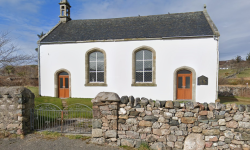Donald Gordon, Edderton
The elders and people of Eddrachillis were most unhappy at the ministry of John Mackenzie. The Presbytery of Tongue therefore appointed an assistant to Mr Mackenzie, a young probationer, Donald Gordon. He was born in 1796 in Strathhaven, south of Glasgow. He educated at King’s College Aberdeen where he obtained an MA in 1819 and also attended Glasgow University. He was appointed schoolmaster at Farr in 1817 and in 1822 was licensed by the Presbytery of Tongue and ordained as assistant minister in Eddrachillis. Little is know of his time on the parish. He was party, along with the elders, other prominent members of the congregation and others outwith the congregation in a petition to remove Mr Mackenzie from the charge. A libel against Mr Mackenzie was brought before the Presbytery in 1824 by the elders of the congregation.
Mr Gordon, along with Mr Findlater of Durness, reporting to the Gaelic Schools Society in 1825 on progress with the Gaelic School at Kinlochbervie, they state:
That the Bible Classes and First New Testament Class read with great ease, intelligence, and accuracy. They also read the Psalm Book in a similar manner. Ten had committed 8 Chapters of the Gospel according to Matthew to memory, and 8 had attained to the 12th Chapter of the Second Gospel. We observed, with particular pleasure, that the majority of the School were adults. To them we conceive the Gaelic Schools of essential importance. Advanced to mature years, some without having an opportunity of being a day at School, and most with the mere acquirement of reading English, or at best with a partial understanding of it, the Gaelic School brings them at once to hear the oracles of the living God declare to them his wonderful Works in their own tongue. Instead of struggling against the outward barrier, they now bring all their intelligence and inquisitiveness to bear on the import of its communications. Instead of receiving their impress though a medium of rare application, it is conveyed in the very language of thought, and every-day intercourse; and instead of formally consulting them on stated occasions, their instructions are clearly understood in reference to doctrine and practice. We have much satisfaction in bearing our testimony, as usual, to the fidelity, industry, and success of the Teacher; and to the good the Society effect by their School in this parish, Though many are apt to be interested merely by novelty and striking facts, to a reflecting mind more gratification is afforded, by the prospect opened through the steady operation of wise and efficient principles, and to these the blessing of Heaven is more generally vouchsafed. As your usual period for continuing your Schools in each station is now to be accomplished at Kinlochbervie, and as there are no urgent causes for its remaining there another Session, we would beg leave to recommend its removal to Scowrie in this parish , where no such School has been, and where from 58 to 60 families will be accommodated. The Parish School is in the vicinity; but that forms no objection, as there English only is taught, and here Gaelic only, and most of the Scholars in the Gaelic School will be adults, who did not or do not learn English. The accommodations will be readily provided, if this request be granted; and, in that case, it is desirable that the Directors make their decision known as early as possible.
In 1826, Mr Gordon again wrote to the Gaelic School Society, this time concerning classes in Scourie:
On the 28th of February, I examined the Gaelic School at Scowrie in this parish. The result was as follows. On the teacher’s list were 70 scholars, and of these only one was absent: 10 read the Scripture Extracts, 38 the New Testament, and 22 the Bible. The more advanced classes repeated from memory various portions of Scripture; a few had committed 9 or 10 chapters to memory. It is scarcely necessary to add, that I felt peculiar satisfaction in witnessing so uncommon a progress as this school exhibited. There were several, who could not repeat the alphabet three months before, who read the New Testament with ease and precision. One feature of these schools is particularly pleasing and striking — the intelligence and interest with which the adult classes seem to read the Scriptures. It is in vain to look for the same feature in almost any of the English schools in the Highlands, and it is not difficult to account for its absence, though nothing else can supply its place. Those attending this school were chiefly adults.”
In September 1829 he was translated to Stoer in Assynt and thereafter to Edderton in 1836. He came out at the Disruption and of necessity had to reside in a house in Tain. He died on 30 August 1847.
In his Statistical Account of the Parish of Edderton in 1845, he tells an interesting story of Alexander Ross Oag who had lived in the Parish over a hundred years before:
At the period of Mr Robertson’s admission to this parish in 1730, there lived an aged Christian, named Alexander Ross Oag, (or Young, a very common patronymic when the father and son were of the same name) a man in indigent circumstances, and without the advantages of education, but of such uncommon natural talents, combined with fervent piety and Christian simplicity, that numerous anecdotes, well authenticated, illustrative of his eminent character, and the estimation in which he was held, especially by the religious public, are still related throughout the northern counties. Though this individual, obscure and unnoticed in all worldly respects, has entered ‘the land of forgetfulness’ upwards of a century ago, such is the veneration and respect in which his memory is still held in this parish that there are several individuals living who were named after him, and even within the last three years there has been one added to the number. It was lately proposed to erect a monument to Alexander Oag’s memory in the churchyard here, where a flat stone marks the place of his interment, but this proposal, though not abandoned, has not yet been carried into effect.
One instance may be recorded exemplifying his confidence in the providential government of God. A sturdy beggar, one of a class very numerous at that period, came to his house late one evening, and asked for a night’s lodging. Alexander met the man at the door, and expressed his willingness to receive him, excepting for his ignorance of the man’s character for honesty, stating that he was a weaver by trade, and must be careful of the property belonging to other people which was under his charge. The ‘gaberlunzie-man’ protested in the most solemn manner as to his honesty and principles, appealing at the same time to the Divine Omniscience as his witness and surety! Your surety is accepted, and you are welcome to such entertainment as I can afford,” was the reply. Here the ‘gudewife,’ who was of quite a different stamp — being a bold, irreligious, worldly woman — interfered, upbraiding her husband for his simplicity, and neglect of his temporal interests, in admitting a perfect stranger on such pretences. Here the beggar again protested to quiet the fears and suspicions of his hostess, and the worthy master of the house repeated his entire satisfaction with the assurances given.
The beggar, discovering the character of his host, endeavoured to the best of his abilities to lead the conversation to religious subjects, and thus occupied the time till he retired to rest. The wife, however, less satisfied with the honesty of her guest than her unsuspicious husband, rose at an early hour on the following morning, and immediately went to her lodger’s apartment to see if all was safe; but what was her alarm on finding the beggar gone, and one of the most valuable webs of cloth in the house carried off! The first expression of her feelings was to attack Alexander for his imprudence in admitting the beggar contrary to her express desire; but his calm and cool rejoinder was, “I appeal to the surety.” The beggar, on starting from Alexander’s house with his ill-gotten booty, at an hour before sunrise, made the est of his way towards Alness, over what was then a trackless moor, many miles in extent; but being overtaken by a dense mist, (it was a morning in the ‘soute [foggy] season’), he wandered about the whole day, without a glimmer of sunshine, or a path which might guide him to a human habitation. At length, soon after nightfall, he observed a feeble rush-light at a short distance, and, overjoyed at the prospect of shelter, food, and rest, exerted his sinking energies, and reached the door of the cottage, at which he knocked several times. A voice which seemed familiar to him inquired from within “Who is there?” To which the weary traveller replied, “A perishing man, who seeks admission in the name of mercy!” “Upon this the door was opened, and the beggar, sinking under fatigue and the weight of his burden, threw himself down near the fire, and, with a groan, looked around to see where he was, and what reception he was likely to get from the inmates. The ‘gudeman’ of the house now came forward, after closing the door, to untie the stranger’s burden, which seemed to oppress him with its weight, and administer consolation to his drooping spirits, when he was startled by the shrill voice of his wife exclaiming, “turn out the thieving villain, or he’ll be making off with more of your webs, I’se warrant.” No, Peggy,” was the reply, “our property is sent back by the Surety, and for His sake the poor man shall be sheltered and entertained this night too.”
The incident was made the occasion of imparting reproof and Christian instruction by Alexander Oag to the poor beggar, who was deeply affected, and it is said permanently benefited under circumstances so remarkable.

